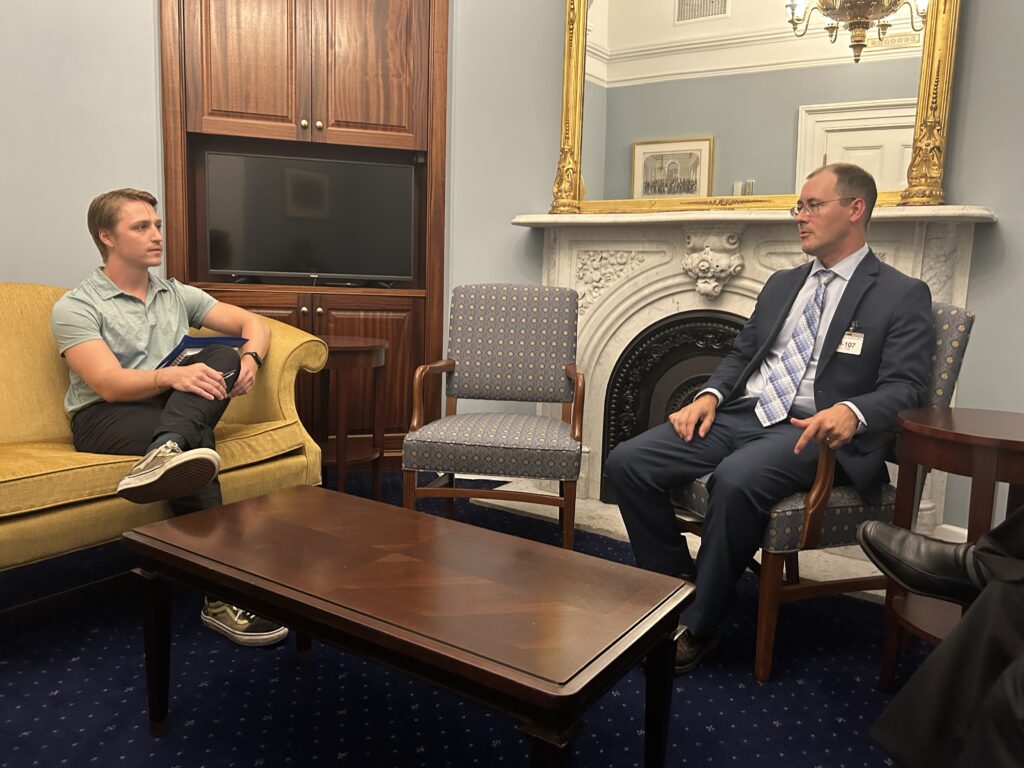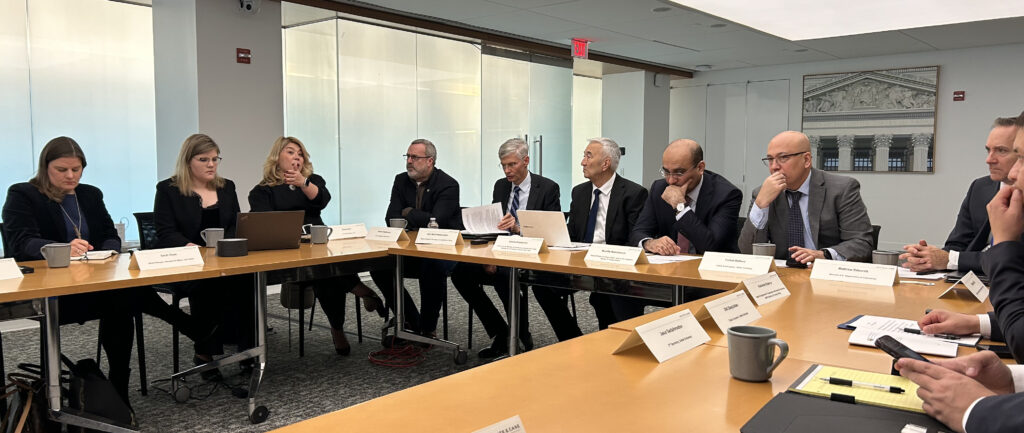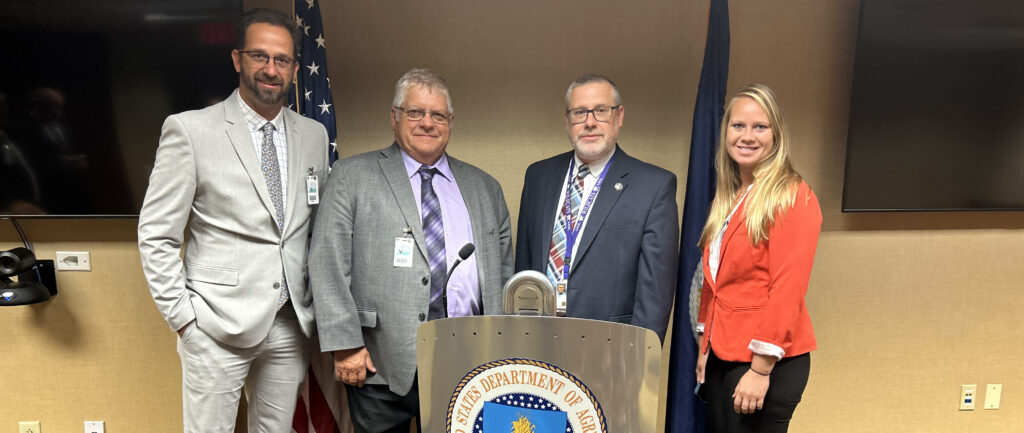With margins already tight during a challenging 2024 growing season, the Minnesota Soybean Growers Association (MSGA) traveled to Washington, D.C., July 16-18 to warn the state’s congressional delegation that a repeat of a trade war with China could have a devastating impact on producers.
“It seems like it’s been a perfect storm lately,” President Darin Johnson told Sen. Amy Klobuchar’s staff. “Trade with China is so important, and we’re starting to feel the squeeze not knowing the future of the Farm Bill. It puts us in a difficult spot.”
China is far and away the largest purchaser of U.S. soybeans, accounting for about 60% of all U.S. exports. In 2023, U.S. farmers exported about $18.8 billion in whole soybeans. In Minnesota, where soy is the state’s top ag export, roughly one in three rows of soybeans is destined for China. The trade war of 2018-2020 and its lingering impact on the farm economy brought back grim memories that Minnesota farmers would rather forget. While U.S. Soy has worked to diversify exports in recent years, farmers told legislative aides that revoking Permanent Normal Trade Relations (PNTR) status from China or imposing additional tariffs would likely have immediate negative impacts on agricultural export markets.
“We pride ourselves in growing the best food source in the world and being a reliable trading partner,” said Redwood County farmer Adam Guetter, one of seven Minnesota farmers representing Minnesota on the American Soybean Association (ASA). “All of us remember the trade war and how it hurt us. That’s a scenario we don’t want to revisit, and we hope our leaders in D.C. see how another trade war with China would hurt us.”
Guetter and Johnson helped lead a team of nine Minnesota farmers as part of ASA’s July board meetings and Hill Visits in Washington, D.C., which saw its hottest three-day stretch of temperatures since the Dust Bowl era. Suffice it to say, MSGA’s two teams of advocates took full advantage of Capitol Hill’s air conditioning.
“It’s been more humid before, but I can’t remember a time when it’s been hotter here,” said ASA Director Jim Kukowski, who’s been on ASA for six years and was reelected to serve another term beginning in December.

Growers kept their cool and relayed during visits to nine Minnesota congressional offices the urgent need to pass a Farm Bill, which saw a one-year extension in 2023. The House bill is now languishing after moving through committee in May, and time is not on lawmakers’ side: Only about five weeks remain on the legislative calendar until the Nov. 5 election, making it increasingly difficult to pass the legislation. It’s also possible Congress could pass the Farm Bill during a lame-duck session after the election; lawmakers could also pass another year-long extension. But the status quo isn’t doing farmers many favors.
“We really need to ensure we pass a bigger and better Farm Bill,” ASA Director Jamie Beyer said. “It’s costing us real money to not have a new bill.”
Growers said the certainty provided in the next Farm Bill, from raising the farm safety net to doubling the funding for trade promotion programs, would go a long way toward easing their concerns heading into 2025. The legislation also helps set a foundation for younger farmers to thrive.
“Those young farmers need opportunities, and the Farm Bill can help set them up for success,” said MSGA Director Bob Worth, who joins ASA’s board in December. “This is about the future of farming.”
Getting to work
Recent flooding in Minnesota also underscored the importance of crop insurance. During meetings with congressional staffers, growers said they anticipate the historic rains and cool temperatures will put a sizable dent in their yields this harvest.
“Prices are already the cost of production, so we’re really going to feel any drop in yield this year,” said Beyer, who farms in Wheaton.
Growers also delivered other key messages to Minnesota’s congressional delegation. ASA supports prioritizing domestically sourced feedstocks in domestic biofuels programs, including the Clean Fuel Production Credit (45Z). Implementation of the 45Z credit must embrace flexibility in farming practices; deliver reasonable compliance measures; and reward environmental improvement throughout the value chain.
In a diverse state like Minnesota, one-size-fits-all production practices are unfeasible, Johnson said.
“We need to embrace multiple practices,” he said. “We have a strong record of conservation here and it’s because what works where I farm in southern Minnesota doesn’t necessarily work in northwest Minnesota.”
Farmer leaders also expressed continued support for the soy checkoff. After a House amendment in 2023 was soundly defeated, a Senate bill (the OFF Act) would also eliminate checkoff programs. For Minnesota soybean producers, checkoff investments have helped build new markets, create value-added uses and sponsored research that improves yield and addresses agronomic issues.
“We wouldn’t be here without the checkoff,” ASA Director George Goblish said. “It’s provided so much benefit to us over the years and improved our bottom lines.”
The July Hill Visits coincided with the Republican National Convention, which meant Congressional leaders were either attending the convention or back home in their districts. For Worth, who’s walked Capitol Hill dozens of times as an advocate, educating legislative aides is equally important as visiting with lawmakers.
“When you go to the Hill, you see how important staffers are,” he said. “They’re working extremely hard behind the scenes, and they really want to learn more about agriculture, about how they can help farmers.”
Following the Hill Visits, Executive Director Joe Smentek met leaders at Morocco’s Embassy in D.C., where he continued Minnesota Soybean’s efforts to promote trade with Morocco via the Port of Duluth-Superior and the St. Lawrence Seaway. Following Farmfest, MSGA will tour the port during its August board meeting; MSGA officers will also return to D.C. in September for a state-led visit to the Hill.
“There’s a lot of work for us to do in the months ahead,” Johnson said, “but also plenty of opportunities to share our message with lawmakers, industry leaders and farmers.”







